Search Results
Search
Filter results
Advanced Filters
Your search returned 10 Solutions
-
Forum theatre alleviates war trauma and creates an inclusive stage and art experience
Northern Uganda Hip Hop Culture's forum theatre addresses the challenges faced by people with disabilities, such as land grabs, denial of rights, and divorce. It uses audience interaction to explore solutions together, and can be easily adapted to different types of issues.
Northern Uganda Hip Hop Culture, The Forum Theatre, Uganda -
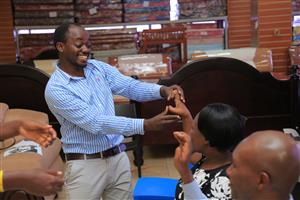
Young people trained as Disability Inclusion Facilitators to motivate employers
The Make 12.4% Work initiative is led by young people with disabilities who are trained and certified as Disability Inclusion Facilitators. They train member organizations to become more inclusive. From 2018 to 2020, 124 organizations have become members and 5,700 people have benefited.
Light for the World Austria, Make 12.4% Work-Initiative, Uganda -
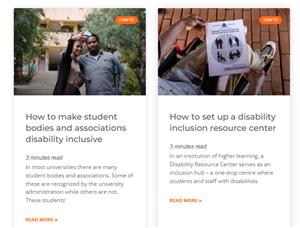
Making African universities and other learning institutes more disability-inclusive with a free web-based toolbox
Light for the World, Austria: Its CapAble platform provides tools and resources for disability inclusion in higher education. Gained over 30,000 users and 240,000 page views between 2021 and 2023.
CapAble, Uganda -
Binding and effective laws for the construction of accessible school buildings
In 2010 the Uganda National Action on Physical Disability developed and launched its Accessibility Standards. In an effort to promote their effective implementation at a local level, the government of Nabbale has developed the By-Law on Accessibility which is the first of its kind among the eight sub-counties forming the Mukono district.
Uganda National Action on Physical Disability, Uganda – Uganda National Action on Physical Disability (UNAPD) – By-Law on Accessibility in the Sub-County of Nabbale, Uganda -
OBLIGATORY ACCESSIBILITY STANDARDS
Uganda is among the first sub-Saharan countries to have developed their own accessibility standards. Uganda’s standards are mandatory for school construction projects and other public facilities. Also a National Accessibility Audit Committee and several District Accessibility Audit Committees were set up.
Ugandan Ministry of Gender Labour and Social Development, Uganda makes accessibility standards mandatory, Uganda -
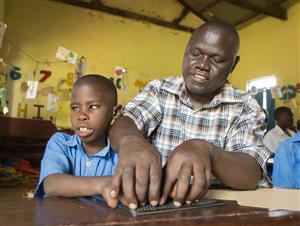
USDC advocates for inclusive education and modifies existing school environments. Schools are made accessible through different factors: teachers, children and parents are sensitised; assistive devices are provided; children with disabilities are integrated into society.
USDC supports schools in helping them to become accessible. It also empowers the parents of children with disabilities to advocate for inclusive policies and teachers are sensitised about disability. To ensure sustainability, USDC works within existing structures and partners with government and other service providers.
Uganda Society for Disabled Children, A fully inclusive and accessible school in Uganda, Uganda -
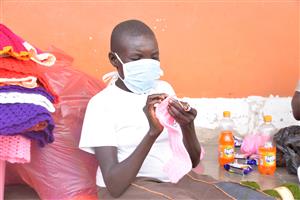
Providing income-generating activities to refugees with disabilities
Launched in 2017, the programme provides inclusive livelihoods for people with disabilities in two refugee settlement areas in Uganda. The water supply is connected to accessible water points, and seeds and tools for vegetable growing are provided. By 2020, 3,215 people have benefited.
World Vision, Inclusive Livelihood for Refugees, Uganda -
Training teachers to keep children with disabilities in school
The specific target group of the project were 180 children in upper primary classes in 12 selected schools. 18 teachers (9 female/9 male) were qualified as master trainers in the inclusive child-to-child methodology. Furthermore, USDC advocates for Inclusive Education, seeking partnerships with likeminded organizations.
Uganda Society for Disabled Children, Uganda -
Reserved elected seats for persons with disabilities
Uganda’s Constitution rules that the State shall ensure fair representation of marginalized groups on all government bodies: the parliament as well as every village, parish, sub-county, and district council. As a result Uganda’s 47,000 representatives with disabilities are easily the largest group of politicians with disabilities in the world.
NUDIPU - National Union of Disabled Persons of Uganda, CONSTITUTION, PARLIAMENTARY ELECTIONS STATUTE & LOCAL GOVERNMENTS ACT, Uganda -
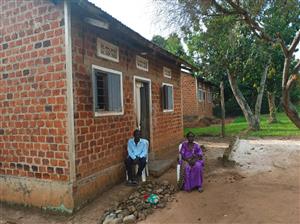
Peer-led organization of persons with psychosocial disabilities in sub-Saharan Africa
Since 2017 the National Self-Advocacy in Uganda (UNSAI) has been assisting people with psychosocial disabilities with ‘Support my Choice’, a programme that enables participants who would otherwise be institutionalized to live independently, benefitting 150 people to date.
UNSAI-Uganda National Self-Advocacy Initiative, Support my Choice, Uganda